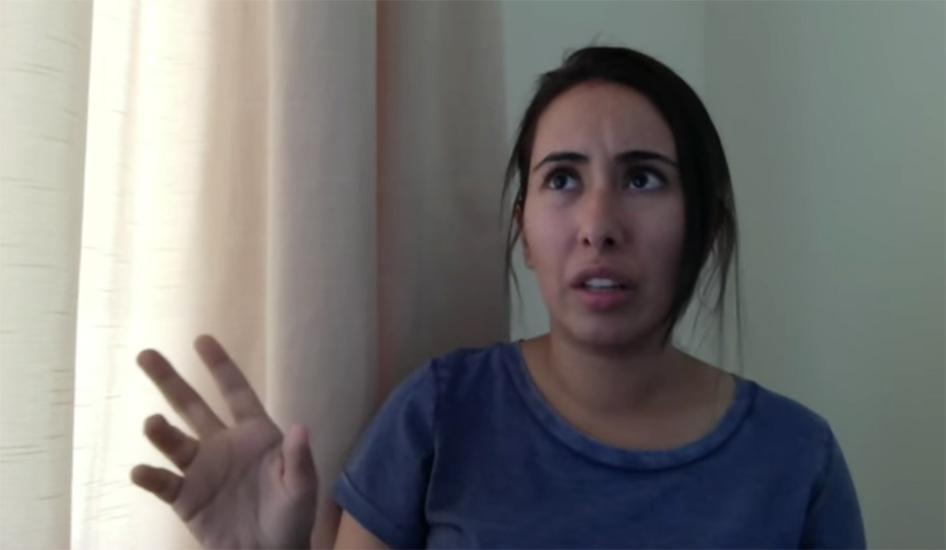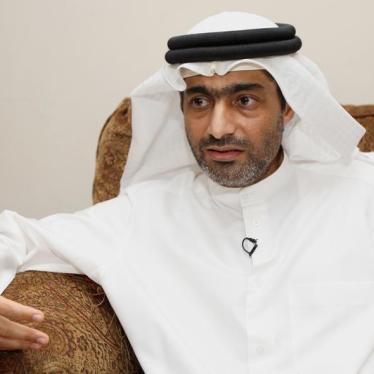(Beirut) – United Arab Emirates authorities should immediately reveal the whereabouts of Sheikha Latifa bint Mohammad al-Maktoum, the 32-year-old daughter of the ruler of Dubai, and clarify her legal status, Human Rights Watch said today. Failure to disclose the whereabouts and status of the princess could qualify as an enforced disappearance, given the evidence suggesting that she was last seen as UAE authorities were detaining her.
A witness told Human Rights Watch that UAE authorities intercepted Sheikha Latifa on March 4, 2018, as she tried to flee by sea to a third country, and returned her to the UAE. Sheikha Latifa, who told friends that she wished to flee restrictions imposed by her family, has not been seen or heard from for two months, raising serious concerns about her safety and well-being, two friends said. On April 18, Agence France-Presse reported that a source close to the Dubai government confirmed that Shaikha Latifa “was brought back” to the UAE.
“UAE authorities should immediately reveal the whereabouts of Sheikha Latifa, confirm her status, and allow her contact with the outside world,” said Sarah Leah Whitson, Middle East director at Human Rights Watch. “If she is detained she needs to be given the rights all detainees should have, including being taken before an independent judge.”
Tiina Jauhiainen, a Finnish citizen and former Dubai resident for 17 years, told Human Rights Watch that she met Sheikha Latifa in 2010 and developed a long-term friendship with her. Another woman, a United States citizen, told Human Rights Watch that she also became friends with Sheikha Latifa after she began giving Sheikha Latifa skydiving lessons in Dubai around 2014. These accounts are in line with media reports from 2017, including a January 24 story on Sheikha Latifa by Emirates Woman, which contains photos of Sheikha Latifa skydiving and describes her as “the daredevil royal who’s inspiring us to be more adventurous.”
Jauhiainen showed Human Rights Watch copies of Sheikha Latifa’s identification cards and educational certificates, which Jauhiainen took out of the country in late 2017 prior to the escape attempt.
Jauhiainen and the skydiving instructor, in individual interviews, confirmed that the person appearing in a recent YouTube video is Sheikha Latifa. In the 40-minute video, Sheikha Latifa says that her older sister, Shamsa, also fled her father while in the UK in 2000 but that UAE authorities later kidnapped Shamsa from the UK and forcibly returned her to the UAE. Media reports from the time support this narrative.
Sheikha Latifa says in the video that she attempted to flee to Oman in 2002 but that UAE authorities stopped her at the border, returned her to Dubai and held her in a detention facility for three years and tortured her.
Jauhiainen said that Sheikha Latifa informed her friend of a new escape plan in the summer of 2017. She said that she and Sheikha Latifa finally left the UAE on February 24. Later that day they joined Hervé Jaubert, a French and American citizen, on his private boat, sailing toward southeast Asia. Jauhiainen said the boat had several Filipino crew members.
Jauhiainen said that on March 4 the boat stopped 50 miles off the coast of Goa, India. She was told about the location by Jaubert. She said that at around 10 p.m. she and Sheikha Latifa were below deck when they heard shouting and gunfire and locked themselves in the bathroom. The cabin filled with gas, forcing them onto the deck. Detained in Dubai, which provides legal and advocacy assistance on cases related to the UAE, told Human Rights Watch that the group had been assisting Sheikha Latifa during the escape attempt, and that she sent the group a distress message when the shouting and gunfire began.
Jauhiainen said that she saw several boats around their boat. Men boarded their boat, pointed guns at her, forced her to the ground, and tied her hands behind her back. She said the men kept shouting in English, “Who is Latifa?” She said she later heard Sheikha Latifa, whom she could not see, trying to break free and repeatedly shouting that she wanted to claim asylum. She said that the men removed Sheikha Latifa from the boat. It appeared that Jaubert and the crew had been mistreated, she said, describing Jaubert’s face as “bloody” and “unrecognizable.”
Jauiainen told Human Rights Watch that the Indian Coast Guard participated in the raid in coordination with UAE authorities. On April 27, Business Standard, an Indian English-language daily newspaper, reported that the raid was authorized by prime minister’s office, citing “highly placed government sources.” When asked about the incident, an Indian Ministry of External Affairs spokesperson, however, told Business Standard “[n]o such incident has been brought to our notice.”
UAE officials sailed the boat back toward the UAE, with her, Jaubert, and the crew locked below deck. After four days, they were transferred to a UAE naval vessel, and three days later arrived back in the UAE.
State Security officials took her to a facility that her captors described as a secret State Security Department detention center for people who represent a “threat to national security,” she said. Following several long rounds of interrogation, during which she said her interrogators threatened her repeatedly with the death penalty, and being kept in solitary confinement, she said she admitted to actions she did not commit, such as sending out the video of Sheikha Latifa.
After another four days of solitary confinement, she said, interrogators told her they would release her if she videotaped a confession and signed several Arabic-language documents she could not read, which she did. She said she later signed what she thought to be a non-disclosure agreement written in English banning her from speaking about the interrogation and Latifa.
On March 22, she said UAE authorities allowed her to return to Finland, but they kept her computer and various other items from the boat. She said they allowed Jaubert and the crew to leave the country on his boat around the same time.
Human Rights Watch has documented numerous incidents of enforced disappearances by UAE authorities in recent years.
Article 47 of the UAE’s criminal law of procedure states that detainees should be taken before the public prosecutor within two days. The UAE’s 2003 State Security Apparatus Law, however, gives state security officers wide powers to hold detainees for lengthy periods without judicial scrutiny. Article 28 of the state security apparatus law, read in conjunction with article 14, allows the head of the state security apparatus to detain a person for 106 days “if he has sufficient reasonable causes to make him believe” that the person is involved in, among other things, “activities that undermine the state … or jeopardize national unity,” “activities deemed harmful to the economy,” or anything that “could undermine, weaken the position of, stir animosity against or undermine trust in the State.”
The state security apparatus law inherently violates article 14(6) of the Arab Charter on Human Rights, which states that “anyone arrested or detained on a criminal charge shall be brought promptly before a judge or other officer authorized by law to exercise judicial power and shall be entitled to trial within a reasonable time or to release.”
The law also puts people at risk of enforced disappearance. An enforced disappearance occurs when someone is deprived of their liberty by agents of the state or those acting with its acquiescence, followed by a refusal to acknowledge the deprivation of liberty or by concealment of the fate or whereabouts of the disappeared person. The nexus between torture and enforced disappearance is well established in international law.
Article 5 of the 2006 International Convention on the Protection of All Persons Against Enforced Disappearances states that: “The widespread or systematic practice of enforced disappearance constitutes a crime against humanity as defined in applicable international law and shall attract the consequences provided for under such applicable international law.” The UAE has yet to sign or ratify the convention.
“The UAE authorities should immediately reveal whether they are detaining Sheikha Latifa and her whereabouts and that of all others they are detaining incommunicado,” Whitson said.








